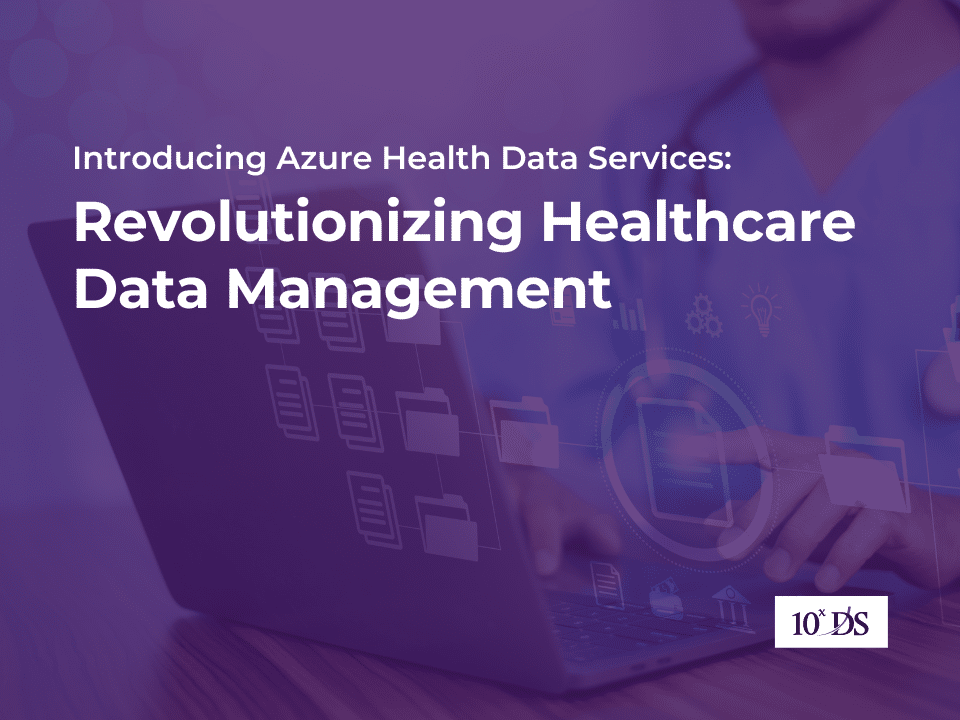
Introducing Azure Health Data Services: Revolutionizing Healthcare Data Management
Microsoft Azure is a comprehensive cloud platform that offers over 200 products and services designed to help you address today’s challenges and create innovative solutions for the future. It allows companies to build, run, and manage applications across multiple cloud, and on-premises environments. With Azure, companies get the flexibility to choose the tools and frameworks that best suit your needs.
Azure Services and Uses
- Compute: Azure offers virtual machines, serverless computing, and container services.
- Networking: Includes virtual networks, load balancers, and VPN gateways.
- Storage: Provides scalable storage options, including blob storage, file storage, and managed disks.
- IoT (Internet of Things): Azure IoT Hub enables secure and scalable device connectivity.
- AI and Machine Learning: Azure Machine Learning and Cognitive Services empower intelligent applications.
- Analytics and Big Data: Azure Data Lake, HDInsight, and Azure Synapse Analytics handle big data workloads.
- Identity and Access Management: Securely manage access to applications and data.
- DevOps and Application Insights: Streamline development, deployment, and monitoring.
Key Benefits of Using Microsoft Azure
Security and Compliance: Azure provides security from the ground up, backed by experts, and proactive compliance trusted by enterprises, governments, and startups.
Hybrid Capabilities: Whether on-premises or across multiple clouds, Azure seamlessly integrates and manages hybrid environments.
Open Source Support: Azure is committed to open source, supporting all languages and frameworks.
Continuous Innovation: Microsoft’s continuous innovation ensures that Azure supports development today and product visions for tomorrow.
In today’s era of digital transformation, the healthcare industry stands at the forefront of innovation, harnessing the power of technology to improve patient outcomes and streamline operations. Azure Health Data Services emerges as a groundbreaking solution, offering a comprehensive platform tailored to the unique needs of healthcare organizations worldwide. From managing vast amounts of patient data securely to enabling advanced analytics and machine learning, Azure Health Data Services promises to revolutionize the way healthcare data is collected, stored, and utilized. In this blog, we delve into the transformative potential of Azure Health Data Services, exploring its key features, benefits, and real-world applications in shaping the future of healthcare delivery. Join us on this journey as we uncover the pivotal role of Azure Health Data Services in advancing healthcare innovation and driving meaningful change in the industry. Azure Health Data Services provides a powerful platform for healthcare organizations to securely store, process, and analyze health data. It ensures that sensitive data, including Protected Health Information (PHI), is handled with utmost care and compliance
Let’s delve into how Azure Health Data Services contributes to effective healthcare data management:
Key Components and Workflow
Azure Application Gateway receives individual Fast Healthcare Interoperability Resources (FHIR) messages over an enhanced-security TLS connection. These messages are sent via Azure API Management to the Health Data Services FHIR service, where they are persisted. For bulk data processing, Application Gateway receives FHIR bundles and loads the data into a storage account. A FHIR Loader Azure function processes bundles and loads data into the FHIR service. Azure Synapse Analytics queries and analyzes FHIR data stored in Azure Data Lake Storage.
Benefits of Azure Health Data Services
Unified Data Platform: It supports both transactional and analytical workloads from the same data store.
Enhanced Security: Organizations can confidently manage sensitive health data while adhering to compliance standards.
Integration with Azure Services: Health Data Services seamlessly integrates with other Azure services, enhancing data insights and interoperability.
Use cases of Azure Health Data Services
Clinical Data Management
Healthcare providers use Azure Health Data Services to manage clinical data efficiently. It allows them to store and process electronic health records (EHRs), lab results, and patient histories securely. By adhering to FHIR (Fast Healthcare Interoperability Resources) standards, Azure ensures seamless data exchange across different systems.
Medical Imaging and DICOM Integration
Azure Health Data Services supports DICOM (Digital Imaging and Communications in Medicine) data. Hospitals and imaging centers can store X-rays, MRIs, and other medical images in Azure. The DICOM cast technology extracts metadata from DICOM instances and integrates it with clinical data, creating a unified dataset.
Healthcare IoT and Remote Monitoring
Azure IoT services enable real-time monitoring of patients and medical devices. Hospitals collect data from wearable devices, sensors, and vital sign monitors. Azure processes this data, allowing for remote patient monitoring and timely interventions.
Predictive Analytics for Population Health
Azure Health Data Services supports predictive modeling. Healthcare organizations analyze data to predict disease outbreaks, allocate resources, and manage population health. Identifying high-risk patients and designing targeted interventions becomes more effective.
Healthcare Chatbots and Virtual Assistants
Azure Bot Service helps create healthcare chatbots. These virtual assistants guide patients through symptom checking, appointment scheduling, and medication reminders. They enhance patient engagement and streamline administrative tasks.
Clinical Research and Data Analytics
Researchers leverage Azure Health Data Services for clinical trials. Securely storing trial data and using services like Azure Databricks for analytics improve research outcomes.
In conclusion, Azure Health Data Services emerges as a game-changer in the realm of healthcare data management, offering unparalleled capabilities to empower organizations in their quest for improved patient care, operational efficiency, and innovation. As we’ve explored throughout this blog, Azure Health Data Services provides a robust and secure platform for storing, analyzing, and deriving insights from vast amounts of healthcare data. By leveraging advanced technologies such as artificial intelligence and machine learning, healthcare providers can unlock new opportunities for personalized medicine, predictive analytics, and population health management. Moreover, Azure Health Data Services fosters collaboration and interoperability, enabling seamless data exchange among healthcare stakeholders to facilitate better decision-making and coordination of care. As we look to the future, the potential of Azure Health Data Services to drive transformative change in healthcare is immense, promising to revolutionize the delivery of patient-centered, data-driven care. Embracing Azure Health Data Services is not just a technological advancement; it’s a commitment to shaping a healthier, more connected world.
Talk to us to learn more about Azure Development Services


